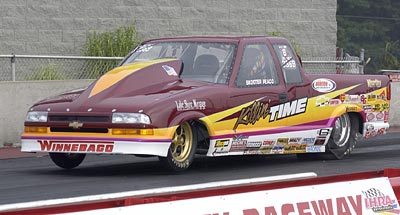
By 1998, shortly after Bader took over IHRA,
Peaco left for Summit, where he expanded its
motorsports involvement to include at one point
the national series' sponsorship at IHRA and
three national events with NHRA, as well as
e.t. programs on both sides of the fence and
primary sponsorship of 13 cars on six teams.
DRO sat down with Peaco shortly after he returned
to the IHRA fold and he described what it means
for IHRA's future.
 DRO:
What made you want to take this new job? DRO:
What made you want to take this new job?
Peaco: Here was a company that was basically
out of business six years ago, but I saw Bill
struggle and work at it and then I watched the
deal with Clear Channel go through. I saw the
progress they were making and though they weren't
where they needed to be or where they wanted
to be, I thought I could have a positive impact.
I thought I could if I had the flexibility of
Bill not micro-managing me or not having to
look over my shoulder all the time -- which
he never did at Norwalk -- but I knew he was
very hands-on with everything.
I believe in my heart that the only thing holding
IHRA back is that Bill is too tied to the inner
workings. Bill puts deals together and does
cross promotions and gets tracks on board. He's
a big picture guy. He's the TV deal guy and
the guy coming up with the next trick deal.
He's a promoter and that's what he does best.
I thought, 'Well, you're not doing any of that.'
He recognized that and at Milan we had a real
big conversation where I thought, 'Well, this
is coming to a point in time where I'm going
to have to stop telling him what's wrong or
do something about it.' So everything came together
at the right time for me personally.
DRO: When did you actually make the agreement
to join IHRA?
Peaco: We were talking about it from Labor
Day on and I was actually at the last three
IHRA races in uniform volunteering my time just
to make sure the contingency department took
care of itself, and I worked with the manufacturers
until they got their new director hired. I was
not looking at that position as a position for
me, though.
DRO: Had you already resigned from Summit at
that point?
Peaco: We parted ways around Labor Day and
I knew for a variety of reasons that that wasn't
where I needed to be.
DRO: Do you see part of your job to be a "lightning
rod" to take some of the day-to-day scrutiny
and criticism off Bill Bader?
Peaco: We're all going to be a part of that.
I'm certainly going to get my share of strikes
as he gets his, but the reality is now you take
Bill away from the everyday rigors of running
the competition side or running the racing side
of IHRA. Now he gets to do the more important
things such as selling more tickets and improving
our facilities.
Aaron Polburn, who is the VP of IHRA, he's
the marketing director and he's going to oversee
marketing, which basically is the web site,
Drag Review magazine, advertising, and all those
departments that are functions of marketing.
David Thompson is the director of sales and
he gets all the sales folks to report to him.
Debra Tobak, who is our financial director,
has folks that report to her and she handles
that part of the national events as well. So
now Bill has four people he can go to instead
of 15, and he's got four people that can manage
and lead their departments instead of having
to do everything himself. Basically, we took
a company that had a horizontal flow chart and
made it a little more vertical.
As long as we're on top of our game nothing
is going to change as far as how IHRA runs;
in fact, it should get better. The service should
get better and the attention to detail should
get better because everybody is responsible
for their own area. Then we're being held accountable
by the Clear Channel group.

|